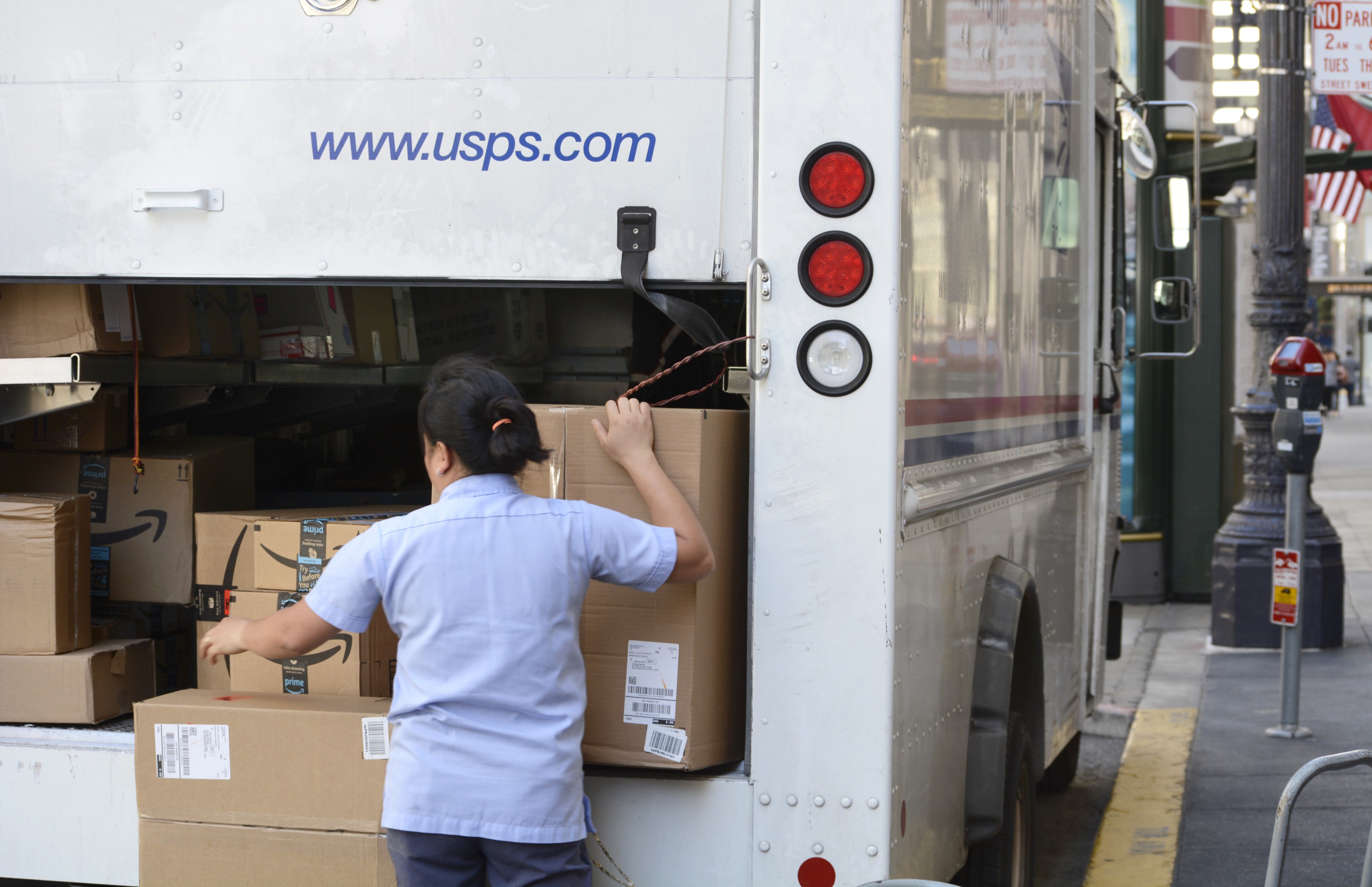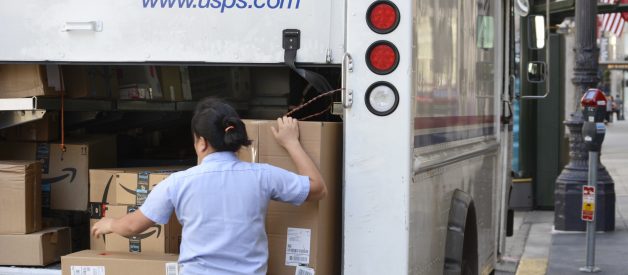Power Trip
How the Post Office?s deal with Amazon has made life hell for mail carriers
 Photo by Robert Alexander/Getty
Photo by Robert Alexander/Getty
 Earlier this year, Amazon became the second U.S.-based company to be valued at more than $1 trillion. Yet for all its dominance and efficiency, Amazon relies on a dusty, centuries-old system to deliver at least a third?and possibly as much as half?of its packages around the country: the United States Postal Service.
Earlier this year, Amazon became the second U.S.-based company to be valued at more than $1 trillion. Yet for all its dominance and efficiency, Amazon relies on a dusty, centuries-old system to deliver at least a third?and possibly as much as half?of its packages around the country: the United States Postal Service.
In mid-October, I spoke with a mail carrier who works at a midsize hub of the U.S. Postal Service in rural New England. As a rural carrier associate, they make just under $18/hour in a continuous, part-time position. During the week, the carrier says that between 75 and 80 percent of the packages they deliver are Amazon packages; on Sundays, when no letters are delivered, they deliver Amazon packages exclusively, the result of a revenue-generating agreement the USPS entered into with the company in 2013.
At the time of the Amazon agreement, the USPS was suffering in the wake of misguided budgetary changes instituted by Congress and the financial crash and was losing $16 billion per year. The Amazon partnership seemed like a godsend. Though even basic contract information remains elusive, we know something about the scale of Amazon?s operation: Early this year, the company announced it shipped more than 5 billion items worldwide through Amazon Prime in 2017; meanwhile, something like half of all Amazon?s shipments in the United States are ultimately delivered by the USPS, an arrangement that market analysts seem to agree is a mutually beneficial one: the Postal Service, which receives no federal funding, reported a net loss of only $2.7 billion in 2017.
?I feel like my life depends on Amazon.?
But the arrangement has also increased the amount of work without also expanding the full-time career workforce. In addition to working Sundays and holidays, part-time employees are called on to cover career carriers? regular routes if they are on vacation or out sick. These workers are paid less, have fewer benefits, and are beholden to more chaotic scheduling than their full-time counterparts; meanwhile, the increasing number of Amazon packages means more?and more difficult?work.
Amazon declined to comment for this story, but the USPS issued the following statement: ?Dedicated Postal Service employees across the country are committed to delivering for the American public and have fostered the recent package growth through exceptional performance. Growth in our package business partially off-set the significant decline in mail and is essential to help stabilize the finances of the Postal Service and pay for our infrastructure that enables us to fulfill our universal service obligation. Like any prudent business, we do not publicly discuss specifics of our business relationships.?
In early 2018, President Trump called for an investigation of the USPS deal with Amazon, the results of which will reportedly not be made public until after the midterms. In response, Amazon and other retailers formed a lobbying group, the Package Coalition, issuing a barely veiled threat that any changes to the arrangement would have consequences. ?The last thing you want to talk about is disrupting one of the few bright spots of the Postal Service,? lobbyist and former Obama administration official John McHugh told Forbes.
The implicit threat has even been internalized in the Postal Service itself. ?I?ve heard that from my supervisors,? the rural carrier told me. ??If we upset Amazon, they?ll pull out, and we need their help.??
?I feel like I work for Amazon,? they continued. ?I feel like my life depends on Amazon.?
The interview below has been edited and condensed for clarity.
Medium: Walk me through a normal day at the post office.
I get to the office at 7:30 a.m., and then you spend like three to four hours casing mail and sorting packages. You spend most of your time doing the mail, but then you spend about 30 to 45 minutes organizing your packages. You get this hamper full of Amazon packages, mostly. Obviously there?s some priority mail packages and stuff like that, [but] I would say like 75 to 80 percent are Amazon packages. You just start marking them and writing down which addresses have packages that need to be delivered.
Then you load up your truck in order, so the packages are in order for first-one-in, last-one-out kind of thing. Then for about four to six hours, depending on how long your route is, you?re driving and delivering packages? I would say my average [day] is like 10 hours.
On a Monday, where you just missed Sunday, you?ll have 40 percent more packages and double the mail. On a Tuesday, after a holiday, I had like 12 trays of mail and four hampers of packages. I was casing for eight hours? so I worked a 14-hour shift.
Can you explain what an Amazon Sunday is?
Amazon made a contract with the Postal Service that they would add a day of delivery on Sundays: No Postal Service packages with Postal Service postage on them are delivered; it?s just Amazon packages. You still get there at 7:30 a.m., but you?re just organizing and loading packages into your truck. Then you?re just delivering those.
They [the USPS] do a computer-generated route every Sunday, so you show up, and depending on who has ordered packages, they hand you a paper sheet of turn-by-turn directions of what the computer has generated as the most efficient route. It?s wildly inaccurate most of the time. I generally know some of these towns now, so I look at these directions, and I?m like ?Well, that?s not even remotely the most efficient path.? But you just have to use it because you can get in trouble if you go off route.
How do they know if you go off route?
Oh, we?re tracked by GPS the whole time. Regular days and Sundays. We have little scanners, and you have to scan every package when you deliver it. But [USPS] also tracks you the whole time you?re driving, so they?ll use it to check up on you. Also, one of our safety regulations is that we?re supposed to limit backing up, ?cause we have a lot of blind spots in our stupid, dinky trucks. They can write you up if they notice on your GPS that you backed up a certain amount during your day. You?ll get in trouble. It can track you right to your steps.
What made USPS an appealing delivery partner for Amazon?
We?re a huge workforce that?s already driving a consistent route everywhere in the country. They?re depending on this pre-existing fleet of shitty 30-year-old trucks that already go everywhere in the country.
It?s a network they can tap into and just feed their packages through without having to establish their own network. It?s the dependability? There?s also just no limit to how much [USPS will] make us work. There?s no limit on days worked in a row with the Postal Service?for RCAs [rural carrier associates] and CCAs [city carrier assistants] at least.
?There are people who work months in a row without a day off, especially around the holidays, with literally no day off.?
In my office, the worst I?ve heard is 17 days in a row. But if you go on the USPS Reddit, which is really good for worker stories, there are people who work months in a row without a day off, especially around the holidays, with literally no day off. I?m kind of an antagonist in my workplace, so I?ve stood up for myself when they scheduled me to work 10 days in a row or something like that. Because we?re so catastrophically short-staffed, they?ve been like ?Well, we don?t want her to quit, so just give her a day off.?
I don?t know if the tendency to overwork the employees [happened] before Amazon, but the Postal Service just refuses to treat their employees like humans, and we deliver Amazon packages until we drop dead.
Do you have veteran coworkers who recall a time before Amazon?
Yeah, definitely. I?ve heard a few people say: ?It never used to be like this.? I think the combination of increased physical labor from delivering the packages is partly what they mean. The other part is just the increase in time worked. Obviously the addition of Sundays and things like that. I don?t know if these are related, but another thing that?s vastly changed is this GPS tracking. They count it in terms of safety procedures?but? there are lot of unsafe practices baked into the way the postal service operates at its core.
Like what?
Truck accidents, which we have a lot of. A few weeks ago, an ARC [assistant rural carrier] from our office, on a Sunday, was looking at those turn-by-turn directions that I was telling you about. The paper ones. He glanced at them because, again, it?s turn-by-turn, and this is a newly generated route for that day. It?s unique every Sunday. So, he doesn?t know where he?s going. He literally just glanced down, and his hand turned the wheel away from the curb a little bit, and then he looked up, realized he kinda drifted, and he overcompensated to the right and hit the curb. Then overcompensated again to the left and his truck flipped over.
He?s okay, but the next day, they took us all in the morning for a safety talk and showed us a picture of the truck flipped over. They?re like, ?Never look at the mail, never look at your directions when you?re on the road.? They put the blame on him for crashing his truck. In my mind I?m like, ?Okay. How the fuck is he supposed to get where he?s going without looking at this?? They make the system work like this, and then they blame you. No matter what, it?s your fault, ?cause you either don?t know where you?re going or you crash your truck.
We have a lot of instances of heat stroke. Every morning, when it?s gonna be hot, the postmaster walks around, reads his little spiel like, ?Stay hydrated. If you need to take a break, take a break in shade. Safety?s your responsibility.? But when they yell at you to your face about being faster and faster every single day?when the fuck are you supposed to take a break? So it?s like, ?Do you want me to be fast, or do you want me to not get heat stroke?? They just tell you these things so that the blame isn?t on them. No matter what, it?s your fault. You?re either slow, or you?re dead. It?s very dystopian. It?s kind of a nightmare right now.
Is there anything else that makes you think, ?People need to know about this??
The other thing is just the physical toll of this job. It?s been on my mind a lot because I have a few co-workers who have some work-related disabilities. A lot of postal workers have rotator cuff injuries and tendonitis?things like that from repetitive motions. But also just a lot of random ones from accidents. We have one of the highest rates of workplace injuries. I don?t know numbers or anything, but I have two co-workers in particular that I?m thinking of. One is an older woman, I think she?s in her sixties, and she has a knee injury that she got on the job. And she has been dealing with attempting to get workman?s comp for over a year, and she still has to come to work. So she does office duty kind of stuff; she doesn?t go out on the road, but she limps a lot.
The other day, I was asking her a little bit about it, and she was like, ?You can?t even imagine how much pain I?m in every single day.? And her experience with workman?s comp has been brutal. The whole workman?s comp system is completely fucked up, and these are federal employees! Everyone should have free health care that?s easily accessible, obviously, but people think postal employees are treated better than they are.
?She thinks her shoulder has been disconnected for months.?
My other co-worker that I?m thinking of has this shoulder injury?unidentified because of the same issue with workman?s comp. The doctor is just like, ?Hmm, I don?t see anything that?s wrong.? Meanwhile her shoulder, she?ll show me all the time, her shoulder slumps down. It?s about an inch and a half lower than her other shoulder, and her hand regularly just is blue. She thinks her shoulder has been disconnected for months, and the doctor that they sent her to is like, ?Hmm, I don?t see anything wrong.? And it?s like, I with my naked eye can see that there is something wrong with her. And because we?re short-staffed, they?ve been sending her out on her route, on the road. And it?s her delivering arm, so she?s been delivering mail with a possibly dislocated shoulder.
Why do they treat you this way?
That?s a hard question to answer. The immediate material reason is because we are catastrophically short-staffed and what they would probably consider ?consumer demand.? Customers demanding six-day-a-week mail delivery and Amazon demanding seven-day-a-week delivery. I feel like I work for Amazon because the physical toll that the job takes on my body is mostly related to packages, and my lack of time off is mostly due to Amazon because of the Amazon Sundays. This is not really answering the question, but I feel like my life depends on Amazon. I imagine that the Postal Service treats us like this because they?re answering the demands of Amazon. Like, ?If we upset Amazon, they?ll pull out, and we need their help.? I?ve heard that from my supervisors.
Tell me about that.
Due to natural human error, once in a while you randomly will miss a package. You?ll get back to the post office and be like, ?Oh, there was this tiny package in my truck and I didn?t see it. I accidentally brought it back.? When I was first starting, my supervisor was saying, ?Oh, if you miss a package just bring it back. It?s not a big deal. You?ll just deliver it tomorrow.? She goes, ?Unless it?s an Amazon package?because we have to deliver every single one of those.? Even if someone paid for two-day priority postal shipping?just as valid a customer as someone who ordered through Amazon?if I miss it, ?No big deal, just deliver it tomorrow.? That?s like their refrain. But if you miss an Amazon package, you better turn your truck around and go deliver it.
When I?m talking to co-workers, something I?ve been trying to do is just like?everyone?s so understandably bogged down with the day-to-day and just getting through the day. They?re not thinking big picture. If something?s wrong, they?re just like, ?Well that?s the fucking way it is.? We all get to that point. You get really beaten down by this kind of work. But I?ve been trying to introduce bigger ideas to people, like, ?Does it have to be this way?? kind of stuff.
Something I?ve been thinking about is just like, if the U.S. government gave the Postal Service 0.0001 percent of the military budget we wouldn?t have to depend on Amazon. If we even had like a dime of federal funding, we wouldn?t be breaking our backs all the time. We could take a step back and reorganize the whole way the Postal Service works in a better and more humane way.
The workers themselves are so tired and beaten down that they haven?t been organizing to push for something like that. It?s a constructed funding shortage that Amazon has exploited for its own purposes. This instituted austerity regarding the Postal Service was the perfect opportunity for Amazon to come in and transform what was at least a mildly public institution into a fully private one.


